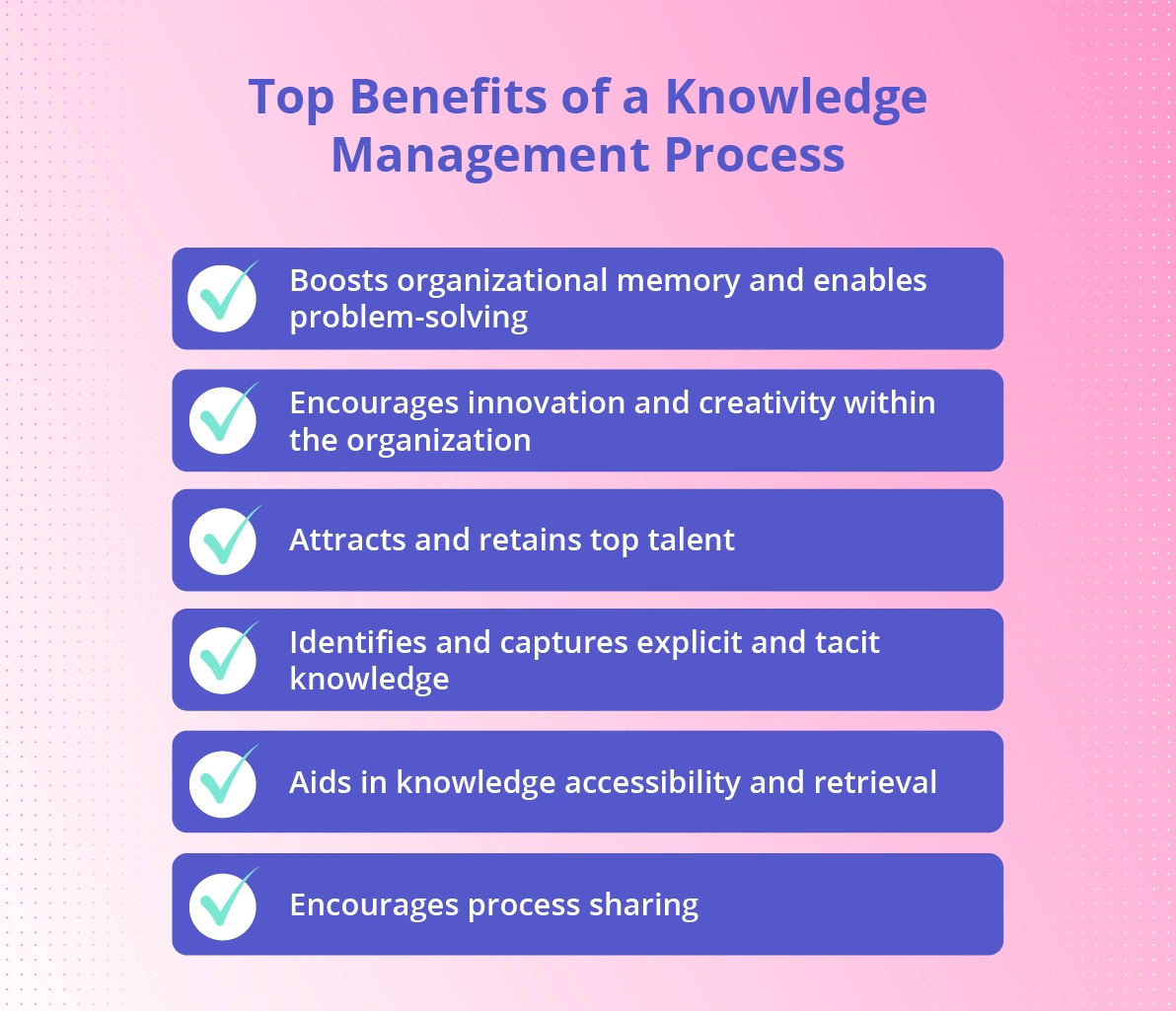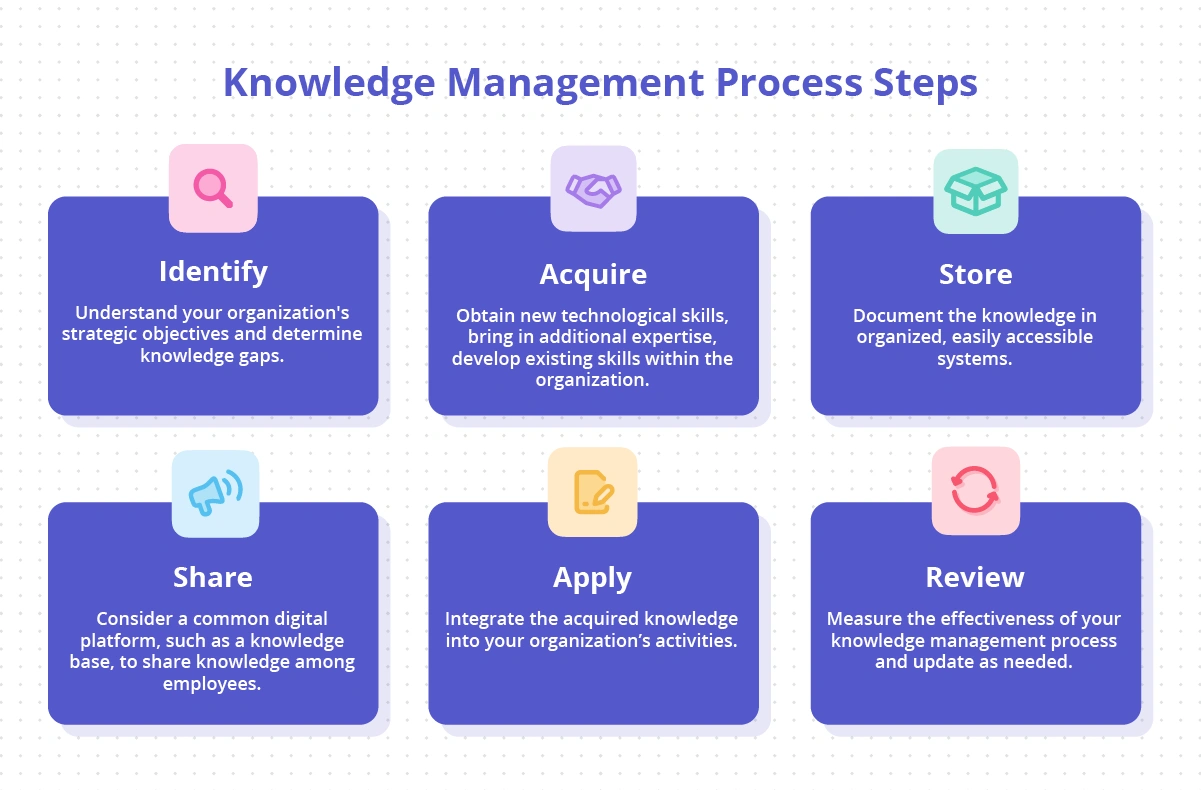The knowledge management process, often synonymous with the process of transforming raw data into valuable organizational resources, is a systematic sequence of activities, adopted by organizations to identify, create, store, share, and utilize knowledge. This encapsulating methodology incorporates a structured approach, such as a knowledge governance strategy, that takes into account different stages like knowledge identification, acquisition, storage, sharing, application, and review. Its ultimate aim is to enhance organizational learning and increase performance.
What is a knowledge management process?
A knowledge management process, in a more detailed perspective, can be comprehended as an integrated approach towards finding, understanding, and making use of all the strategic information and knowledge available within an organization. From an operational perspective, it manipulates the processes of capturing, distributing, and effectively utilizing knowledge to facilitate innovation, foster decision-making processes, stimulate cultural change, achieve competitive advantage, and overall, enhance the level of organizational effectiveness.
So, what is a knowledge management process in real-life scenarios? It is the lifeline that links strategic views to implementation actions, bolstering individual and collective learning. It serves a critical function in improving processes, developing innovative ideas, and aiding in problem-solving. Not merely limited to maintaining or incrementing organizational efficacies, it also weighs heavily in shaping strategic plans, determining organizational structures, and influencing organizational behaviors.
A deeper dive into the knowledge management process embeds the significance of it being cyclic and interactive rather than strictly linear. Knowledge is captured from both internal sources (employee know-how, internal databases) and external sources (customer feedback, market research), and this newly captured knowledge undergoes validation before it is shared across the organization as actionable insight. It is then used to improve processes, products, and services, and in turn, creating more knowledge, thus completing the cycle.
Why is a knowledge management process important?
Organizations with a strong knowledge management process achieve up to a 30% improvement in productivity and significant cost savings, making it stand as a pivotal mechanism in organizational practice and aiding in the efficient harvesting and application of accumulated knowledge within a business. Viewing the importance of knowledge management process through a magnifying lens, one can discern its indispensable impact on an organization's overall performance and positioned competitiveness within current marketplace dynamics.
Encompassing varying facets, the knowledge management process operates on directives of acquisition, creating new knowledge, storing pertinent information, and using this reservoir of knowledge to inform crucial decision-making processes. Each stage of this intricate process holds significance that contributes to the broader knowledge strategy, making the cogent understanding of each stage and its implications paramount. By treating knowledge as an integral asset in an organization's arsenal, this process substantiates the effective use of intel collected from all tiers of an organization.
Without a doubt, the opposition between corporations thriving in today’s globalized, knowledge-based economy and those merely surviving--or worst yet, closing down—is a testament to the importance of a knowledge management process, displaying how the mastery of organizational knowledge and constant learning can be a ticket to success. This effective process is integral to improving the efficiency of productivity, fostering innovation and competitiveness, and continually learning from past practices to amplify future potential.
Top benefits of implementing an effective knowledge management process
The knowledge management process draws its essence from the theory and application of managing and using the accumulated knowledge within an organization. This strategic management approach is primordial to drive innovation, improve efficiency, and sustain competitive advantage.
Before delving into the expansive benefits a knowledge management process has to offer, one must understand the intricacies of its mechanism.
Boosts organizational memory and enables problem-solving
Incorporating structured learning within normal business operations, it minimizes time wasted in ‘re-discovering’ previously used solutions. It offers an avenue for learning from the past, lest errors reoccur, and good practices are forgotten. Consider this as akin to a refining method that continually learns from itself, thus ensuring more productive and effective processes. The availability and sharing of knowledge stimulate creative thinking, thereby nurturing innovation that bolsters the organization's competitive advantage. And the reduced time spent on reinventing the wheel, along with minimized errors and rework, contributes to significant cost savings.
Encourages innovation and creativity within the organization
By providing a platform where cross-disciplinary knowledge can be shared, it allows for collective thinking and optimizes inventive capacities of employees. This synergy plays a pivotal role in improving product and process development, sparking originality within the business's offerings. This extends to streamlining business operations, aligning them to strategic business objectives, and eliminating redundancies.
Attracts and retains top talent
Organizations with effective knowledge management processes are perceived as learning organizations, thereby attracting high-caliber employees who value intellectual growth and seek progressive professional environments. The process supports continuous learning and development for employees, propelling their professional growth while deepening their expertise.
Identifies and captures explicit and tacit knowledge
An effective knowledge management process paves the way for informed decisions based on relevant, reliable, and up-to-date business information. Explicit knowledge refers to the type readily articulated in words, illustrations, or numbers, and can be easily communicated and shared. Tacit knowledge, on the other hand, is intuitive, contextual, and hard to formalize, demanding a more interactive and personalized approach for its transfer.
Aids in knowledge accessibility and retrieval
85% of employees state the need for better access to knowledge in their organizations. For this reason, technology steps in to systematically categorize the amassed data and develop repositories like databases and electronic documentation tools to capture knowledge and organize it to aid accessibility and retrieval. By providing the right knowledge at the right time, it becomes easier for employees to carry out their tasks efficiently and effectively, thereby improving productivity.
Encourages process sharing
Organizations with effective knowledge-sharing are 3 times more likely to be innovation leaders than their competitors. For this reason, process sharing, where the collated knowledge is disseminated across various teams, departments, or individuals in the organization ensures fluid communication channels and promoting a knowledge-sharing culture. Additionally, with a well-structured reservoir of collective knowledge, the threat of knowledge loss due to employee turnover or retirement is considerably mitigated.

6 crucial stages in a knowledge management process
Knowledge management is a systematic approach to creating, collecting, sharing, and utilizing knowledge to meet organizational goals. Dispelling the misconception that it's merely a technological aspect, it's robustly about people, processes and culture. Despite the different schools of thought on the number of steps in the process, six stages reign preponderant in most literature.
Embracing the six stages of the knowledge management process can streamline decision-making procedures, ignite innovation, and strengthen the organization's competitive position. Additionally, it can foster a culture where continuous learning is encouraged, and knowledge sharing is the norm. Furthermore, a well-implemented process can also yield tangible outcomes in terms of cost efficiency, customer satisfaction, and overall business growth.
1. Knowledge identification
The initial stage in the knowledge management process involves identifying the kind of knowledge that is essential for the organization. This phase requires understanding the organization's strategic objectives and determining the knowledge gaps that need to be filled to achieve these goals. To carry out this task, knowledge managers may choose to engage employees in brainstorming sessions, conduct surveys, or utilize other information gathering techniques.
2. Knowledge acquisition
Following identification, the next stage in the process is the acquisition of the identified knowledge. This could mean acquiring new technological skills, bringing in new expertise, or developing existing skills within the organization. This acquisition may be done through methods like training and development sessions, seminars, conferences, and more. It's crucial that this knowledge is relevant and practical, making it significant for the organization's needs.
3. Knowledge storage
Once the desired knowledge is acquired, it's time for the third step - knowledge storage. This stage involves the careful documentation and storage of knowledge in organized, easily accessible systems. These systems can range from visual knowledge bases, which are much easier to consume and retain, to more traditional approaches like physical files or electronic databases. Storage should be structured in a manner that facilitates smooth retrieval when needed, making it a key link in this chain process.
4. Knowledge training
With knowledge securely stored, the next phase is the dissemination or sharing of this knowledge. In the context of organizations, this usually manifests in team meetings, presentations, group discussions, or workshops whereby the acquired knowledge is diffused within the organization for mutual benefit. Consider a common digital platform to share such knowledge would be a knowledge base.
5. Knowledge application
It’s worthless if the acquired and disseminated knowledge is not put into practice. This stage includes integrating the acquired knowledge into the organization’s activities, thereby positively impacting decision-making, problem-solving, and innovative initiatives.
6. Knowledge review
The final, overarching area is the audit stage. Here, the effectiveness of the knowledge management process is systematically reviewed and measured. This evaluation is crucial to check whether the acquired knowledge is continuously applied and shared, or if it has lost its relevance. If the knowledge no longer serves the organization's objectives, it should be updated or replaced.
It's vital to underscore that the success of the knowledge management process is not solely dependent on these stages, but rather, it’s contingent on how effectively these stages are implemented. This requires a supportive organizational culture, active involvement from the management, and effective knowledge management tools. Successful knowledge management is less about the process and more about the people.

Getting started with a knowledge management process in your organization
The value of the knowledge management process is immense as it leads to the creation of new knowledge, fosters a culture of continuous learning, boosts productivity, and delivers a competitive edge – all of which are vital for the sustainable success of modern organizations. Therefore, organizations that manage to harness the power of knowledge management effectively are invariably poised for sustained growth and continuous innovation.
Visit our features page to learn more about how a knowledge management process can unlock the limitless potential of your organization's intellectual resources.



